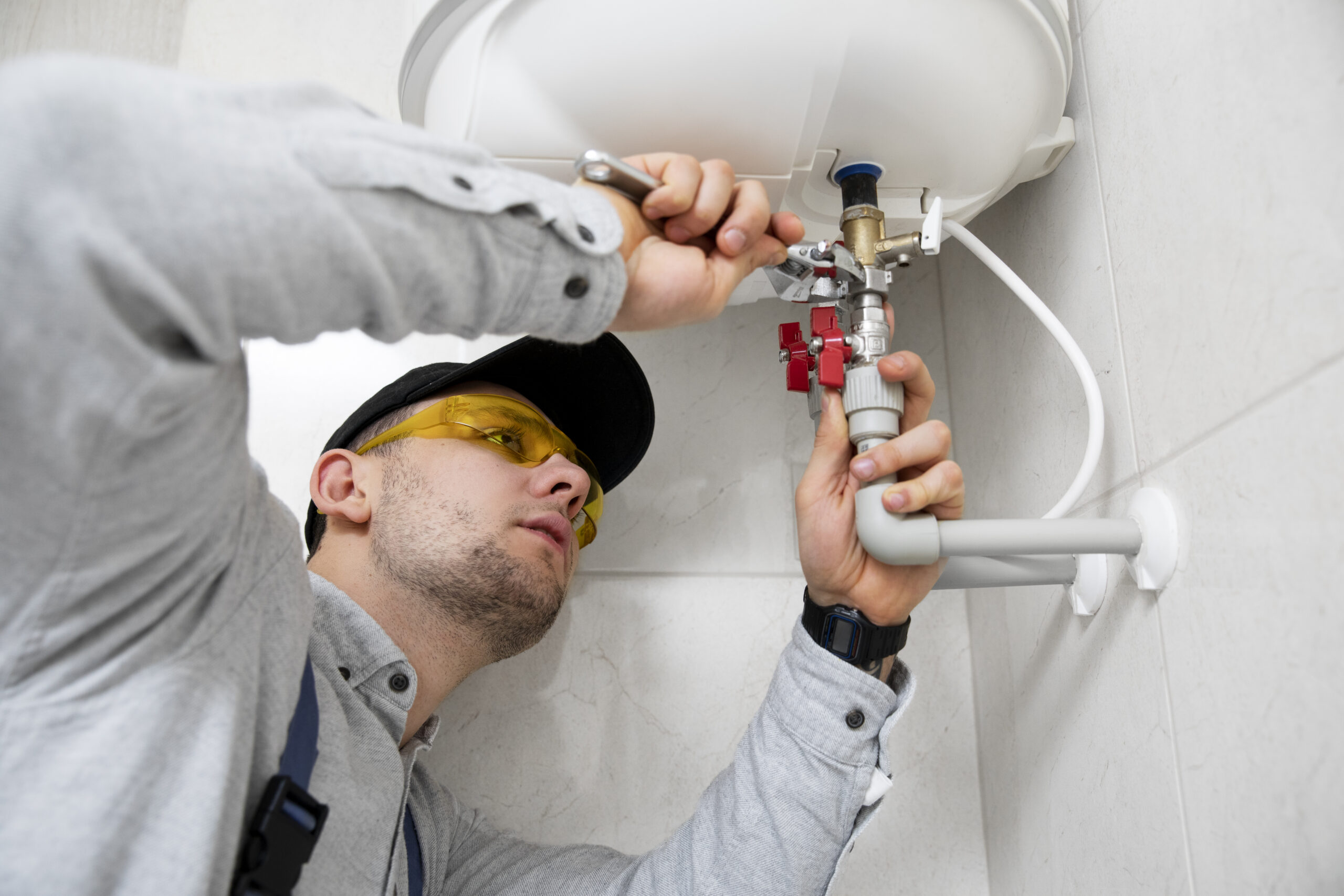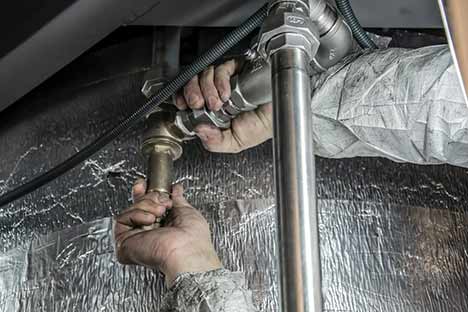Critical Plumbing Solutions: What to Do Until Help Arrives
Critical Plumbing Solutions: What to Do Until Help Arrives
Blog Article
We have discovered this great article about What to Do While Waiting for an Emergency Plumber directly below on the internet and think it made sense to write about it with you on this page.

Pipes emergency situations can strike any time, triggering anxiety and possible damages to your home. Whether it's a ruptured pipe, a blocked drain, or a dripping tap, understanding exactly how to manage the situation till an expert plumber gets here can conserve you from further complications. This write-up gives necessary emergency plumbing pointers to assist you alleviate damages and gain back control throughout a plumbing crisis.
Turn Off the Water Supply
The very first step in any kind of pipes emergency is to shut off the water supply. For local problems, such as a leaking tap or commode, shut off the valve near the fixture. When it comes to a significant leak or burst pipeline, locate your home's main water shut-off shutoff and turn it off instantly. Knowing the area of these shutoffs in advance can save beneficial time throughout an emergency.
Shut down Your Hot Water Heater
In specific emergencies, such as a ruptured pipe, it's wise to shut down your hot water heater. This avoids getting too hot or damages to the unit when water quits flowing. Switch off the power supply to the water heater (electric or gas) and allow it cool off to avoid prospective risks.
Momentarily Quit a Burst Pipeline
A burst pipe can bring about considerable water damages in mins. To mitigate the concern:
Call a professional plumber promptly to address the issue permanently.
Have an Emergency Pipes Package
Prepare a basic pipes emergency situation kit to deal with minor problems properly. Your kit ought to consist of:
Having these tools on hand can make a considerable distinction in your capacity to manage emergencies.
Unclog Drains Safely.
A stopped up drainpipe can be a frustrating and unpleasant issue. Here's how to tackle it:.
If these approaches do not function, prevent utilizing extreme force, as it may get worse the obstruction.
Handle Overflowing Toilets.
An overflowing toilet can create prompt turmoil. Here's what you should do:.
Address Small Leakages with Short-term Fixes.
Tiny leakages can rapidly become substantial issues if left unattended. Use these short-lived repairs till expert help gets here:.
While these solutions aren't permanent, they can aid reduce water loss and damages.
Manage Frozen Pipes Meticulously.
In cooler climates, icy pipes are an usual emergency. If you presume a frozen pipeline:.
Know When to Call an Expert.
While quick fixes can aid temporarily, specific pipes concerns need prompt professional attention. Call a plumber if:.
Immediately calling a professional guarantees the issue is dealt with correctly and avoids further complications.
Avoid Further Damage.
Taking fast activity to decrease damages can conserve you time and money in the long run. Here's how:.
Final thought.
Plumbing emergencies can be frustrating, however with the best knowledge and devices, you can handle the circumstance effectively till assistance shows up. By turning off the water, attending to small leakages, and using short-lived repairs, you can reduce damages and maintain your home safe. Remember, these pointers are momentary services; constantly seek advice from a qualified plumbing to handle the origin of the problem. Prep work and quick thinking are your finest allies in any pipes emergency.
Expert Tips for Emergency Plumbing Repairs
Plumbing emergencies can be incredibly stressful and inconvenient. Whether it’s a burst pipe, a clogged drain, or a leaky faucet, these common plumbing emergencies need immediate attention to prevent further damage to your home. But before you panic, it’s important to understand the basics of plumbing repairs and the steps you can take to address these emergencies. In this article, we will share some expert tips to help you navigate through these situations and minimize potential water damage.
Identifying Common Plumbing Emergencies
Leaky pipes and faucets Clogged drains and toilets Burst pipes Low water pressure Water heater problems Essential Tools for Plumbing Repairs
Plunger: Useful for unclogging toilets and drains Adjustable wrench: Needed for tightening or loosening nuts and bolts Pipe wrench: Ideal for gripping and turning pipes Tape measure: Necessary for accurate pipe measurements Plumber’s tape: Helps create watertight seals Understanding Emergency Plumbing Services
Emergency plumbing services are designed to provide immediate assistance for unexpected plumbing issues that can cause significant damage to your home, business, or health. These services are typically available 24/7 and are staffed by experienced plumbers who can quickly diagnose and repair a wide range of plumbing problems.
When a plumbing emergency strikes, time is of the essence. Whether it’s a burst pipe flooding your basement or a gas leak posing a serious risk, emergency plumbing services ensure that help is just a phone call away. These professionals are equipped with the tools and expertise to handle any situation, minimizing damage and restoring your plumbing system to proper working order.
What Constitutes a Plumbing Emergency?
Burst pipes or water supply lines: These can cause extensive water damage and need immediate repair to prevent flooding. Gas leaks or suspected gas leaks: Gas leaks are extremely dangerous and require prompt attention to avoid potential explosions or health hazards. Sewer backups or overflows: These can lead to unsanitary conditions and significant property damage. Clogged drains or toilets causing water to overflow: Overflowing water can damage floors, walls, and other structures. Leaks or water damage causing structural damage: Persistent leaks can weaken the structural integrity of your home or business. No hot water or heating: A lack of hot water can be more than an inconvenience, especially in colder months. Common Causes of Plumbing Emergencies
Aging or corroded pipes: Over time, pipes can deteriorate, leading to leaks or bursts. Improperly installed or maintained plumbing fixtures: Faulty installations or lack of maintenance can result in unexpected failures. Tree roots or other debris infiltrating your sewer line: Roots can grow into pipes, causing blockages and backups. Frozen pipes or water supply lines: In colder climates, pipes can freeze and burst, leading to significant water damage. High water pressure or sudden changes in water pressure: Excessive pressure can strain pipes and fixtures, causing them to fail. Natural disasters such as floods or earthquakes: These events can disrupt your plumbing system and cause severe damage. Steps to Minimize Water Damage
Locate the water shut-off valve: Knowing where the valve is can help you quickly cut off the water supply to the affected area. Turn off the water heater: If there’s a risk of water coming into contact with the heating element, make sure to turn off the water heater to avoid potential accidents. Open faucets and drain pipes: By opening faucets and drain pipes, you can relieve pressure and empty any standing water. Collect and contain water: Use towels, buckets, or bins to collect water and prevent it from spreading to other areas of your home. https://leecountyplumbingandwellservice.com/expert-tips-for-emergency-plumbing-repairs/

Do you really like reading up on What to Do While Waiting for an Emergency Plumber? Give feedback down the page. We'd be delighted to know your suggestions about this entry. We hope that you visit us again in the near future. Loved our article? Please share it. Let another person discover it. Thank you for being here. Return soon.
Apply Now Report this page